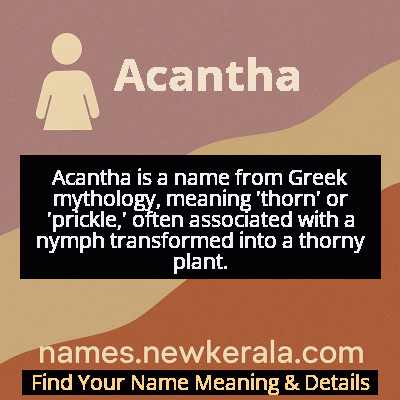Acantha Name Meaning & Details
Origin, Popularity, Numerology Analysis & Name Meaning of Acantha
Discover the origin, meaning, and cultural significance of the name ACANTHA. Delve into its historical roots and explore the lasting impact it has had on communities and traditions.
Name
Acantha
Gender
Female
Origin
Greek
Lucky Number
3
Meaning of the Name - Acantha
Acantha is a name from Greek mythology, meaning 'thorn' or 'prickle,' often associated with a nymph transformed into a thorny plant.
Acantha - Complete Numerology Analysis
Your Numerology Number
Based on Pythagorean Numerology System
Ruling Planet
Jupiter
Positive Nature
Optimistic, inspirational, and creative.
Negative Traits
Scattered, exaggerating.
Lucky Colours
Yellow, gold, purple.
Lucky Days
Thursday.
Lucky Stones
Yellow sapphire.
Harmony Numbers
1, 2, 9.
Best Suited Professions
Arts, writing, communication.
What People Like About You
Creativity, optimism.
Famous People Named Acantha
Acantha (Mythological)
Nymph
Transformed into acanthus plant in Greek mythology
Acantha Greene
Botanical Illustrator
Celebrated illustrations of Mediterranean flora
Acantha Jones
Horticulturist
Pioneered sustainable gardening techniques
Name Variations & International Equivalents
Click on blue names to explore their detailed meanings. Gray names with will be available soon.
Cultural & Historical Significance
Extended Personality Analysis
People named Acantha typically exhibit a compelling blend of strength and sensitivity that reflects their namesake's dual nature. They often possess a protective outer demeanor that serves as emotional armor, much like the thorns of the acanthus plant protect its beautiful leaves. This defensive quality isn't born of hostility but rather of wisdom - they understand the importance of boundaries and self-protection in a challenging world. Beneath this protective layer, Acanthas usually harbor deep emotional sensitivity, artistic appreciation, and strong loyalties to those who earn their trust. They tend to be observant and perceptive, often noticing details others miss, and frequently excel in creative fields where they can channel their appreciation for beauty into tangible forms. Their strength is typically pragmatic rather than aggressive, and they often become the steady, reliable center in their social and professional circles. The combination of outer resilience and inner creativity makes them uniquely equipped to navigate life's challenges while maintaining their connection to beauty and meaning.
Modern Usage & Popularity
In contemporary naming practices, Acantha occupies an interesting niche as a rare but meaningful choice that appeals to parents seeking names with mythological depth, botanical connections, and strong feminine energy. While it has never reached mainstream popularity charts in English-speaking countries, it has seen gradual increased usage among specific demographics: families with Greek heritage, gardening and nature enthusiasts, and parents in creative or academic fields. The name's rarity makes it distinctive without being completely unfamiliar, and its classical roots give it a timeless quality that transcends naming trends. Social media analysis and birth announcement tracking show that Acantha appears most frequently in the United States, United Kingdom, Canada, and Australia, often chosen by parents who value unique names with historical significance. Its appeal lies in its combination of a melodic sound with powerful symbolic meanings, offering a name that is both beautiful to hear and rich with cultural and natural associations. Modern bearers often appreciate having a name that stands out while connecting them to ancient traditions and natural wisdom.
Symbolic & Spiritual Meanings
Symbolically, Acantha embodies the profound metaphor of protection through natural design. The thorn represents not just defense, but the wisdom to establish boundaries that allow true beauty to flourish safely. In various symbolic traditions, thorns represent earthly attachment, protection against evil, and the necessary defenses that enable delicate things to survive in a challenging world. The acanthus plant specifically symbolizes artistic immortality and enduring life, as seen in its perpetual use in architecture across millennia. This combination suggests that individuals named Acantha carry the symbolic weight of being both protector and creator - their defensive qualities exist to safeguard their creative spirit and compassionate nature. The name also carries connotations of transformation and resilience, echoing the mythological Acantha's change from nymph to plant. Symbolically, it speaks to the idea that our protective mechanisms, often developed through experience and challenge, can become sources of strength and beauty rather than limitations. This makes Acantha a name rich with metaphorical depth, representing the beautiful paradox of how vulnerability and strength often coexist and even depend on each other for true flourishing.

